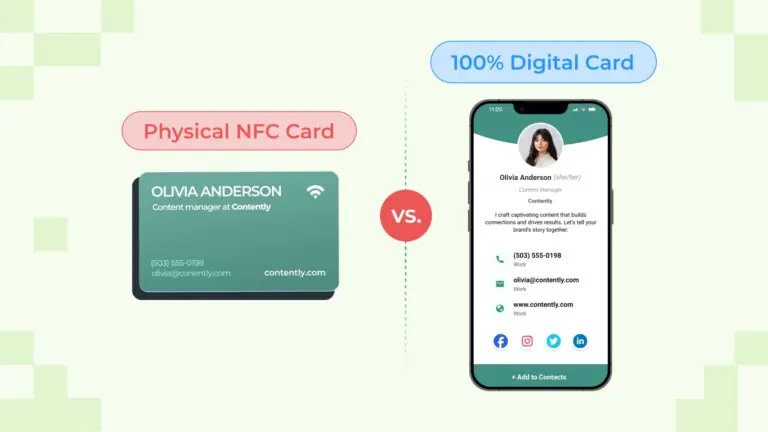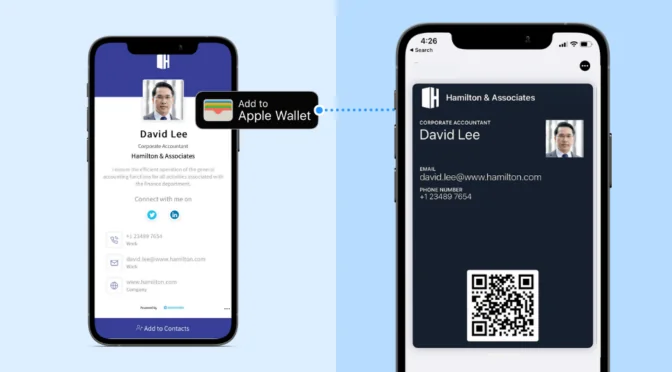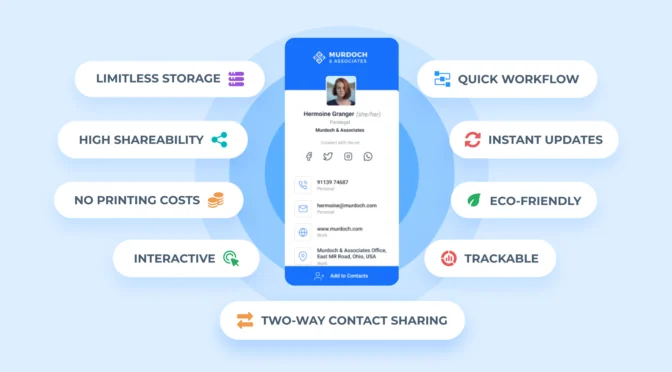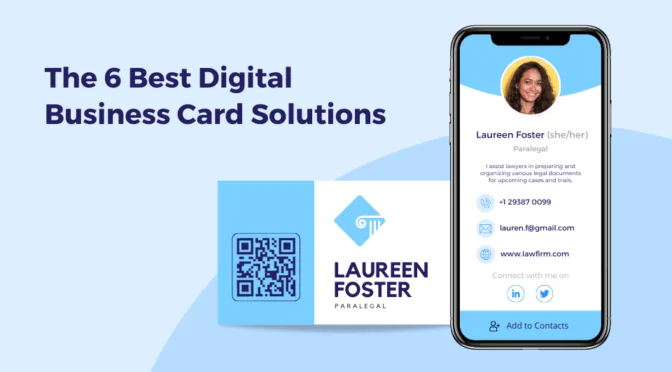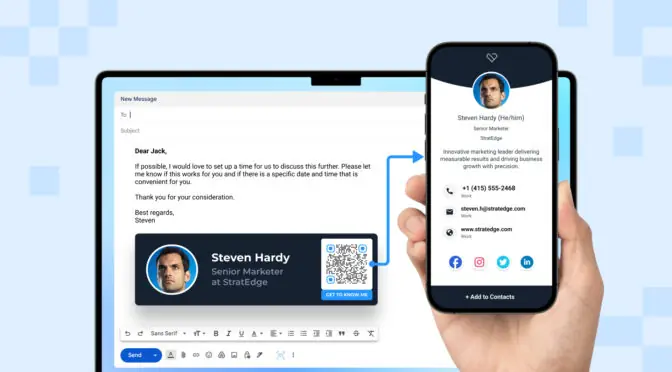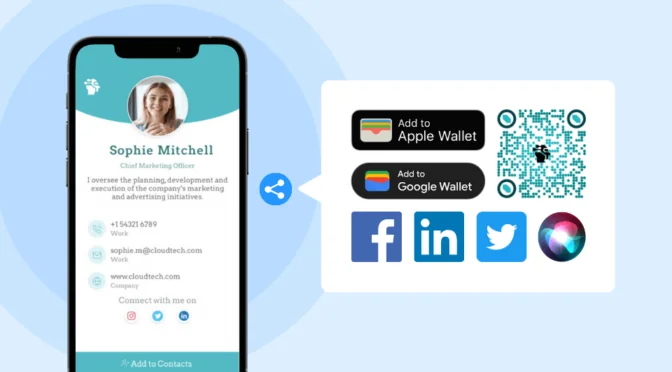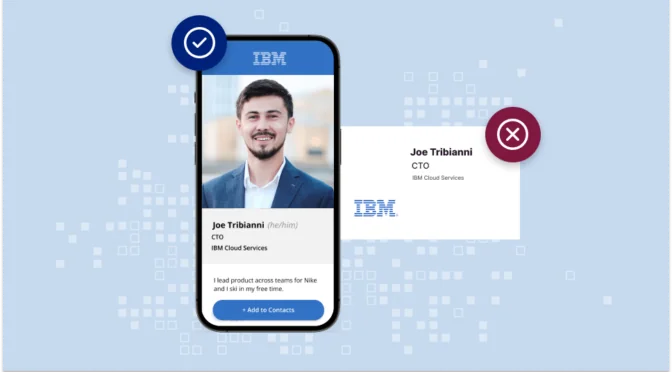Now that you’re thinking about ditching paper business cards and going digital with your networking, you might consider two popular options: NFC and digital business cards. But are NFC business cards a good idea? To determine the best choice for your business, let’s examine the key differences between these alternatives.
Table of contents
The difference between NFC business cards and digital business cards: Which one should you go for
Many people consider NFC business cards digital because you create and store your business card information virtually. But, in reality, they still rely on a physical card that requires recipients to tap their mobile device on it.
For this reason, NFC business cards do not support 100% digital networking. To maximize your networking reach, you need to go beyond sharing your business card through physical means. This is where digital business cards, also known as e-business cards or virtual business cards, come in.
Digital business cards operate entirely virtually. You can create and share them digitally without needing a physical card made of materials like cardstock or PVC plastic, which are commonly used for printing NFC business cards. Being 100% paperless, digital business cards outperform NFC business cards in terms of shareability, ease of use, cost-effectiveness, and many other essential networking aspects. Switching to digital business cards from NFCs is a wise decision.
Here are six key reasons why you should choose digital business cards over NFC business cards for professional, contactless, and sustainable networking.
1. Your digital business card is always with you, whereas a NFC card isn’t
You can only share NFC cards in person, so you might misplace or forget your physical card. To avoid this, go 100% digital with a virtual business card you can instantly create and send to your mobile device to share with clients whenever needed. This ensures you can access your virtual business card anytime without carrying a physical card.

Uniqode’s digital business card solution lets each user in your organization create multiple unique business cards for different use cases. For instance, a team member may create one card for casual business meetings and another for formal client networking.
2. Contactless sharing: NFC cards aren’t 100% contactless
NFC cards can only be shared through face-to-face networking. During a meeting, your recipient must tap their mobile device on your physical card’s NFC tag to access your details. This tap-and-go approach is not a truly contactless experience.
Digital business cards, on the other hand, are 100% paperless and touchless. They can be shared via Apple Wallet or Google Wallet, as well as through a QR Code or URL. For truly touchless and paperless networking, you need a digital business card that can be shared as a wallet pass from your mobile device.
For example, Uniqode lets you share your digital business card as an Apple Wallet or Google Wallet pass. This 100% contactless method lets your client perform a quick QR code scan to access and save your contact information.
3. Security: Digital business cards are more secure than NFC business cards
NFC technology is not without its set of security risks. For example,
- Hackers can intercept signals between your NFC card and your recipient’s mobile device and gain access to your card’s sensitive and confidential information.
- A physical medium with your company’s name and logo is at risk of misuse.
- Ex-employees or others can exploit previous company-issued cards for unauthorized transactions.
Additionally, you have no way of knowing if your recipient’s mobile device has proper security measures in place. An unsecured device puts your card at a higher risk of eavesdropping attacks, which can lead to replay attacks and payment processing fraud.

To minimize data privacy risks, switch to a digital business card solution that protects its cards and users with enterprise-grade security measures such as strong data encryption to safeguard data, both in storage and while being transferred over networks. Central management (with SSO login, role-based access, and Multi-Factor Authentication) allows you to suspend individual cards at any time to prevent misuse.
LEARN MORE: How to choose the most secure digital business card solution
As the first digital business card platform to become SOC 2 Type 1 and Type 2 certified, Uniqode upholds the industry’s highest security and privacy standards. Learn more about why Uniqode is the most secure digital business card solution.
4. Cost: Digital business cards are significantly more cost-effective
With NFC business cards, you incur significant card creation and printing costs. For example, a single custom-designed NFC business card costs approximately $20 through an NFC business card platform. And that’s just the cost of the physical card itself. You also have to factor in shipping and handling fees.
Digital business cards, on the other hand, are significantly more cost-effective because they’re 100% paperless. You don’t have to pay for a physical medium or shipping costs.
For instance, your card expenses can be as low as $6 per user, depending on the pricing plan you choose with Uniqode.

5. Create and access: You can instantly create a digital business card and begin sharing it right away
Because they’re physical, NFC business cards have to be manufactured and delivered before they arrive at your company. This process can take up to 30 days, especially if your company has strict procurement procedures. Switching to a digital business card solution eliminates this lengthy turnaround time.

You can create a digital business card in minutes, whether you’re making a single card for yourself or creating them in bulk for your team members. Once created, you can immediately start sharing your virtual business card via Apple or Google Wallet, QR Code, or URL.
LEARN: Why digital business cards are the best paper business card alternative
6. Eco-friendliness: Digital business cards are more eco-friendly and sustainable compared to NFC cards
Study shows that PVC—the material typically used to make NFC business cards—produces a significant amount of carbon footprint (about 18 million metric tons of CO2 annually in the US).
Switching to a different material doesn’t necessarily solve this issue since the replacement material may also emit CO2 during its manufacturing process. The only way to conduct truly eco-friendly networking is to use a digital business card, which results in a significantly reduced carbon footprint. Networking through a virtual business card helps you conduct sustainable networking, which can attract eco-conscious customers.
NFC vs. digital business cards: At a glance [Infographic]
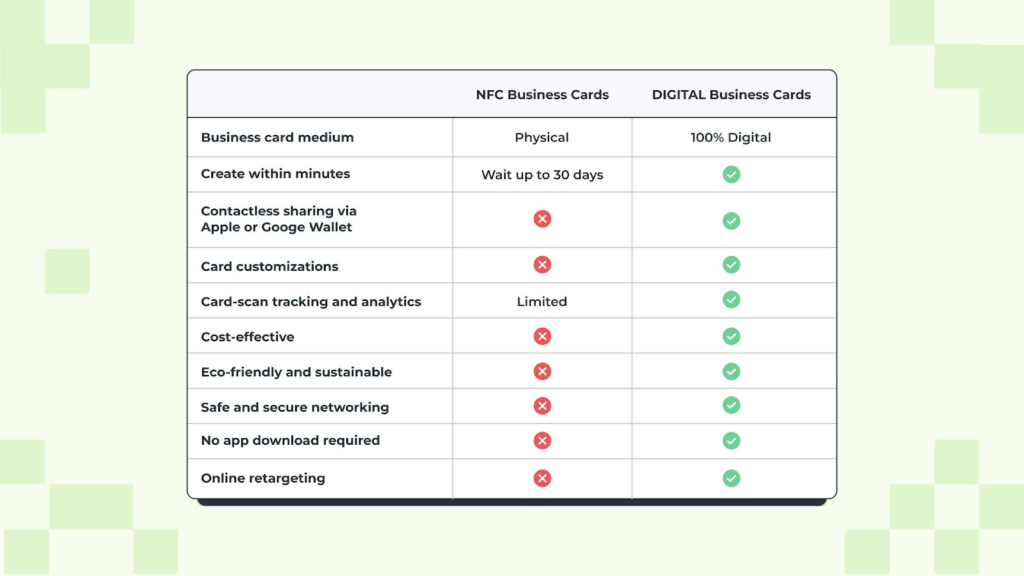
Switch to Uniqode’s digital business cards for ROI-driven networking
Now that you understand why digital business cards are the better choice over NFCs, the next step is to choose a capable digital business card solution.
Choosing Uniqode’s digital business card gives you all the features you need to create, manage, and share e-business cards at scale:
- Share your digital business cards via Apple Wallet (or Google Wallet)
- Enable two-way contact sharing to capture warm leads using your card
- Track and analyze your digital business card’s engagement metrics
- Centrally manage all e-business cards created within your organization
You can access these functionalities (and more) without downloading an additional app. Enterprise-grade security measures also safeguard your networking activities.

NFC vs. digital business cards FAQs
What are the main disadvantages of NFC business cards?
If you are considering NFC business cards for yourself or your organization, consider the following drawbacks:
- NFC business cards require you to carry a physical medium.
- This physical medium has a tendency to be lost or misplaced.
- NFC business cards have a heftier price tag than digital ones.
- Turnaround times for NFCs can take weeks after purchase, depending on different factors, such as your company’s procurement process and material availability.
- Your card’s tap-and-go mechanism does not permit 100% contactless sharing.
- Your networking data is less secure and at a higher risk of compromise.
- NFC business cards are not 100% eco-friendly.
Can I share my digital business card as a URL through various digital channels?
Yes. A specialized digital business card solution will allow you to easily access the URL for each card you create. Once copied, you can begin sharing it through various digital channels such as your email signature, social media, SMS, WhatsApp, and more.
Note: Some NFC business card platforms do not issue business card URLs to their end-users. This means you cannot distribute your business card content digitally, restricting you to depend solely on your NFC-enabled physical card.
Learn more about the key differences between physical and digital business card solutions.
Are NFC business cards worth it?
NFC business cards are a step up from paper business cards. However, these alternatives still inherit the many drawbacks of their paper predecessors. Due to their reliance on a physical medium, NFC business cards are bound to in-person sharing.
They also do not offer an entirely contactless networking experience and may present security concerns, such as unauthorized access, misuse, and transmission signals being intercepted by hackers. You can overcome these issues by switching to digital business cards (or e-business cards).







